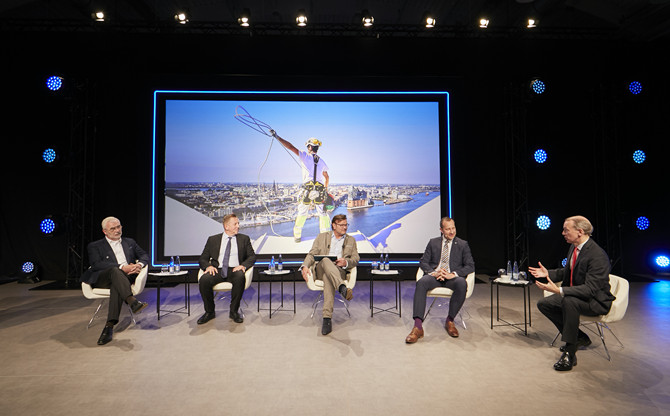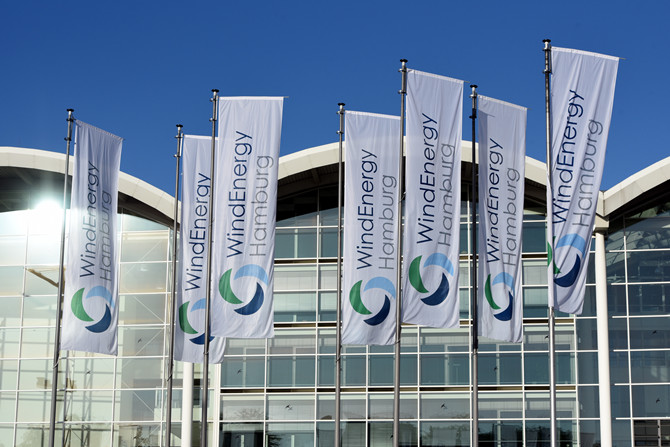Green hydrogen plays a crucial role in the climate-neutral energy mix of the future, and Jorgo Chatzimarkakis, CEO of Hydrogen Europe, speaks out about independence from fossil energies against the backdrop of the Ukraine conflict: “In order to reduce dependence on Russian gas and replace fossil fuels with renewable energy sources, there is no way around green hydrogen. We are at a historic turning point that gives us the opportunity to set a course for a net-zero-carbon future. Here, HydroGenewables are one of the most significant enablers – to make our energy system both more robust and fit for the future.”

Creating synergies: partnerships and networks for the energy transition
Cross-border energy security ensured by locally available, affordable, regenerative energy requires new solutions for the provision of energy. And there are promising approaches both in wind energy and the hydrogen sector.
Aivars Starikovs, Chairman of the Latvian hydrogen association, provides a glimpse of the future capabilities of the Baltic nations: “All three Baltic states are set to become key suppliers of green hydrogen for EU industry. Together, Estonia, Latvia and Lithuania can supply 831 TWh of renewable electricity for the production of green hydrogen – this corresponds to at least 16 million tonnes per year.” These capacities can only be achieved through close cooperation at a political and industrial level. Ben Backwell also highlights the political responsibility of nations when it comes to replacing fossil fuels with renewable energy sources, and says: “The energy transition is a global challenge and growth has to take place globally.
Here, Europe's REPower-EU plans are a strong start, but they have to be supported by policies that make it possible for industrial companies to work together in various regions and sectors. This is the only way to ensure that a global transition to sustainable, renewable energies becomes a reality. We have seen initiatives in other countries that have brought about real change: Vietnam, Japan, Brazil and Chile are examples of how governments can define ambitious targets and put their plans into practice. These kinds of measures will drive the transition in these regions.”
And Morten Dyrholm, Group Senior Vice President, Marketing, Communication, Sustainability and Public Affairs at wind turbine manufacturer Vestas, emphasises the necessity for cross-sector cooperation. He adds: “In order to achieve European and global targets, the wind industry needs more locations, quicker approval procedures, and considerable investment in transport and logistical infrastructure for onshore and offshore wind power, the electricity grid, and hydrogen. It has to be possible to overcome all obstacles at a global, European, national, regional and local level quickly.”
Helping to shape industry growth: the significance of a leading global trade fair for the development of the wind industry and hydrogen economy
Giles Dickson outlines the enormous growth potential of renewables: “Today, electricity makes up a quarter of the European energy system. By 2050, this will be three quarters. Fifty-seven per cent of total energy consumption will then be directly electrified, 18% indirectly via green hydrogen and its derivatives. Wind energy is ideally positioned to drive this process. By 2050, 50% of all electricity in the EU will come from wind. We are therefore delighted to be the European partner of WindEnergy Hamburg 2022. During WindEnergy, we will analyse and discuss how this energy transition can become a reality.”
Aivars Starikovs again explicitly emphasises the significance of Hamburg in the hydrogen economy: “It is extremely important that the H₂EXPO & CONFERENCE become a hub and meeting platform in Hamburg. The H₂EXPO & CONFERENCE can achieve the crucial task of building bridges between northern and southern Europe in order to tackle economic and ecological challenges together and with added force.”
Bernd Aufderheide summarises the speaker statements and sends a clear message regarding trade fair participation: “Sustainable societal and political strategies when tackling climate change and eliminating the use of fossil fuels result from dialogue. And this is precisely what we offer our guests during WindEnergy Hamburg and the H₂EXPO & CONFERENCE in Hamburg. With more than 1,200 exhibiting companies and excellently networked partners such as the experts from the GWEC and WindEurope, as well as national industry associations like the VDMA and BWE, we expect 30,000 guests from 100 countries to help shape a climate-neutral future.”
The opinions expressed herein are the author's and not necessarily those of The Xinde Marine News.
Please Contact Us at:
media@xindemarine.com



 Ningbo Containerized Freight Index Weekly Commentar
Ningbo Containerized Freight Index Weekly Commentar  Ningbo Containerized Freight Index Weekly Commentar
Ningbo Containerized Freight Index Weekly Commentar  Ningbo Containerized Freight Index Weekly Commentar
Ningbo Containerized Freight Index Weekly Commentar  BIMCO Shipping Number of the Week: Bulker newbuildi
BIMCO Shipping Number of the Week: Bulker newbuildi  Ningbo Containerized Freight Index Weekly Commentar
Ningbo Containerized Freight Index Weekly Commentar  Ningbo Containerized Freight Index Weekly Commentar
Ningbo Containerized Freight Index Weekly Commentar